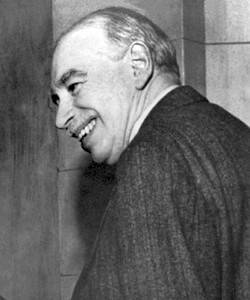
FAQ About John Maynard Keynes

Who was John Maynard Keynes?
John Maynard Keynes was a British economist born on June 5, 1883, in Cambridge, England. He is best known for his pioneering work in macroeconomics, particularly for developing the theory known as Keynesian economics. His ideas have profoundly influenced economic policies and practices worldwide, especially during times of economic recession and depression.

What is Keynesian economics?
Keynesian economics is a macroeconomic theory developed by John Maynard Keynes during the 1930s in response to the Great Depression. It posits that total spending in an economy (aggregate demand) is the primary driver of economic growth and employment. Keynes advocated for increased government expenditures and lower taxes to stimulate demand and pull the economy out of depression.

Why is Keynesian economics important?
Keynesian economics is important because it provided a new framework for understanding and managing economic cycles, emphasizing the role of government intervention in stabilizing economies. Before Keynes, classical economics favored minimal government intervention. Keynesian theories helped justify fiscal policies that counteract economic downturns, such as stimulus spending, which have become staples in modern economic strategy.

How did Keynes influence economic policy during the Great Depression?
During the Great Depression, Keynes critiqued the prevailing economic policies that advocated for budget cuts and austerity. Instead, he argued for increased government spending to boost aggregate demand and alleviate unemployment. His ideas influenced numerous New Deal programs in the United States and helped shape modern economic policies focused on proactive government intervention.

What is the fiscal policy according to Keynes?
According to Keynesian economics, fiscal policy involves government changing levels of taxation and spending to influence economic outcomes. Keynes believed that during a recession, governments should increase spending and decrease taxes to stimulate demand. Conversely, during economic booms, governments might tax more and spend less to cool down the economy.

Did Keynes's theories face any criticism?
Yes, Keynesian theories have faced criticism, particularly from proponents of classical economics and monetarism. Critics argue that excessive government intervention can lead to inefficient resource allocation, inflation, and increased national debt. Despite these criticisms, Keynesian economics remains influential and is often adapted in contemporary economic policy-making.

What are the key works of John Maynard Keynes?
The key works of John Maynard Keynes include 'The Economic Consequences of the Peace' (1919), 'A Treatise on Probability' (1921), and his seminal book 'The General Theory of Employment, Interest, and Money' (1936), which laid the foundation for Keynesian economics. These works have had a significant impact on both economics and political thought.

How did Keynes's early life influence his economic theories?
John Maynard Keynes's early life, including his education at Eton and King's College, Cambridge, exposed him to influential thinkers and economists. His upbringing in an academic environment fostered a deep interest in economic theory and the functioning of markets. The economic conditions he observed later, such as the post-World War I economy, helped shape his views on the necessity of government intervention in markets.

What was Keynes's role in the post-World War II economic order?
After World War II, Keynes played a crucial role in the creation of the Bretton Woods system, which established modern international financial institutions like the International Monetary Fund (IMF) and the World Bank. His ideas helped shape this economic order, emphasizing the need for financial stability and coordinated international economic policies.

How is Keynesian economics relevant today?
Keynesian economics remains relevant today as many governments apply its principles during economic downturns. During financial crises, such as the 2008 recession, governments worldwide adopted Keynesian-style policies, using stimulus spending and monetary easing to boost aggregate demand and curb unemployment.

What did Keynes believe about unemployment?
Keynes believed that unemployment was primarily caused by insufficient aggregate demand. He argued that when people and businesses cut back on spending, overall demand in the economy falls, leading to reduced production and job losses. His theories advocated for government intervention to stimulate demand and reduce unemployment.

How did Keynes view inflation?
Keynes saw inflation as a secondary concern compared to unemployment during economic downturns. He believed that when the economy is suffering from inadequate demand, inflation is unlikely to occur, and therefore, policies should focus on boosting demand and employment rather than controlling inflation.

Did Keynes's ideas influence the New Deal?
Yes, Keynes's ideas significantly influenced the New Deal policies implemented by President Franklin D. Roosevelt during the Great Depression. His advocacy for increased government spending to boost demand complemented the New Deal's emphasis on public works, social welfare programs, and economic regulation.

What is "The General Theory of Employment, Interest, and Money" about?
"The General Theory of Employment, Interest, and Money," published in 1936, is John's Maynard Keynes's most influential work. It challenged classical economics and introduced concepts such as aggregate demand as the driver of economic activity, the importance of government intervention, and the principle of equilibrium in economies. This book reshaped economic theory and policy.

How has Keynesian economics evolved over time?
Keynesian economics has evolved over time through the integration of new theories and updates based on real-world economic developments. Post-Keynesian economists have expanded Keynesian ideas, considering factors like market imperfections, price setting behaviors, and the global economy. Hybrid models combining Keynesian aspects with elements of other theories, like monetarism, continue to evolve in academic and policy circles.

Can Keynesian economics coexist with free market principles?
Yes, Keynesian economics can coexist with free-market principles. Keynesian theory does not oppose free markets but advocates for strategic government intervention to correct market failures and stabilize economies during recessions. Many countries apply Keynesian theories within predominantly free-market frameworks, balancing intervention with economic liberalism.

What impact did Keynes have on modern macroeconomics?
John Maynard Keynes had a profound impact on modern macroeconomics by shifting the focus from individual market behaviors to national economic policies. His emphasis on aggregate demand, fiscal policy, and government intervention during economic downturns led to the development and adoption of strategies that modern economies use to combat recessions and manage growth.

What distinguishes Keynesian economics from classical economics?
Keynesian economics differs from classical economics mainly in its approach to market dynamics and government intervention. Classical economics champions minimal government involvement, relying on self-regulating market forces to achieve economic equilibrium. Conversely, Keynesian economics supports active government policies to stimulate demand and manage economic cycles, especially during downturns.

How do governments typically implement Keynesian economic policies?
Governments implement Keynesian economic policies through fiscal measures such as increased public spending, tax cuts, and monetary policy actions aimed at stimulating demand. During recessionary periods, authorities may initiate infrastructure projects, social programs, or subsidies to boost consumption and counteract rising unemployment.

What are some examples of Keynesian policy successes?
Examples of successful Keynesian policies include the economic recovery following the Great Depression through New Deal initiatives, which helped reduce unemployment and stimulate growth. More recently, stimulus measures during the 2008 financial crash, such as the American Recovery and Reinvestment Act, are cited as successful Keynesian interventions that prevented deeper economic downturns.
